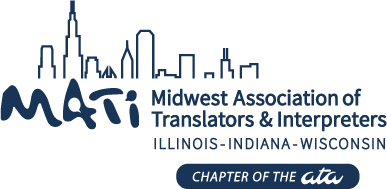When Alexandra Wirth took over as Wisconsin Court Interpreter Program Manager in February 2021, she knew she was accepting a big responsibility at a critical moment. Courts around the state had recently begun using video remote interpreting (VRI) for hearings being held via Zoom due to the COVID-19 pandemic. Judges, clerks, and interpreters needed training in how to provide high quality remote interpreting services to courts. MATI board member and inforMATIon contributor Kelley D. Salas spoke with Wirth recently to learn more about it.
inforMATIon: How did court interpreting change in Wisconsin in response to the pandemic, and what does it look like now?
Alexandra Wirth: Wisconsin had to act very fast to allow access to justice. The need for video remote interpreting had been recognized by the state, and a pilot program was underway in the northern counties of Wisconsin prior to the pandemic. The pandemic catapulted the idea, and Zoom became the easiest route to address the need for VRI. Though Zoom was not engineered for court use, it provides the means to do remote interpretation. By now, most interpreters who actively work in Wisconsin are very familiar with the nuances of Zoom and have gone above and beyond to adapt to the new conditions of work that are often very hard.
inforMATIon: With the use of more video remote interpreting, what steps did your office take to ensure high quality court interpreting services?
Alexandra Wirth: We started to train court staff in terms of best practices for VRI, technology troubleshooting, and walkthrough sessions. We offered demos to show clerks and judges how to use the simultaneous interpreting feature in Zoom, with interpreters who volunteered their time to train court staff. People are under the assumption that VRI is very easy, and that the interpreter perhaps works “less,” only because they are working from home. We needed to make sure that we established certain parameters so that the courts and staff understand that fatigue is still an issue, even if the interpreter is working from home. Zoom fatigue affects all participants, and interpreters have the added demands of VRI, such as toggling between languages, making sure transitions are smooth between partners, monitoring several devices during team interpreting, acoustic shock, and difficulties to interject and ask for clarifications. To protect against fatigue and preserve the accuracy of the interpretation, it’s important to staff two interpreters for longer hearings on Zoom, just like we would in the courtroom. The fact that I am a certified interpreter has helped tremendously in advocating for the right work conditions for interpreters across the state as we transitioned to VRI.
inforMATIon: What kind of preparation is required for video remote interpreting?
Wirth: VRI requires not only subject-matter preparation, but interpreters also have to take care of technical issues that were never part of their jobs before. Interpreters train on different VRI platforms, invest in headsets with noise cancelling and acoustic shock protection, and purchase faster internet connectivity to meet the demands of VRI and to make sure the conditions of work at home are met. For a freelancer, this is an investment that was not planned for.
inforMATIon: What would you say to someone who has just had a challenging experience with video remote interpreting in court?
Wirth: Don’t give up on it. Video remote interpreting is a must in today’s world. It’s not going away.
Interview conducted by Kelley D. Salas for inforMATIon. Kelley D. Salas is an ATA-certified Spanish>English translator and editor specializing in nonfiction and children’s literature. She is an experienced medical interpreter and a certified court interpreter in Wisconsin and Illinois. Salas serves on the MATI board of directors. www.salastranslations.wordpress.com
